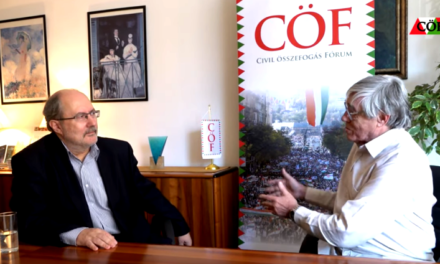or unprincipled left, stable government. The XXI. In Század Intézet's new show Kaktusz, political philosopher Gábor G. Fodor and history professor András Gerő discuss the current issues of the campaign twice a month for half an hour. In the second broadcast of the program, topics such as the difficulty of commitment to an unprincipled left-wing coalition, the intervention of international forces in the Hungarian elections, and the representation of the Hungarian national interest at the Central European level were discussed.
The starting point of the conversation was the weekend's mobilization competition, in which the pro-government Peace March, which mobilized a crowd of hundreds of thousands, far surpassed the left-wing rally of a few thousand. According to Gábor G. Fodor, the weekend was a test of commitment, as it was about whether we would undertake a value-based community or whether we would support an "unprincipled coalition".
András Gerő agreed with this, and that is precisely why he considers it problematic that a "political homeless person" like Péter Márki-Zay does not aim to be able to form a coalition in both directions, but rather joins forces with the left in order to come to power. He emphasized that the so-called everyone in the "coalition of the clean" has given up their principles, the only common point is no more than O1G.
TO THIS, G. FODOR ANSWERED THAT IT IS PRECISELY UNPRINCIPLES THAT FORM THE COMMON FUND, AND MÁRKI-ZAY DOESN'T REPRESENT THE THIRD BLOCK, BUT SIMPLY MOVED TO THE LEFT SIDE.
According to the interlocutors, the question arises for a reason, what should one be enthusiastic about in the case of a left wing based on such foundations? The revolutionary atmosphere is not present thanks to Hungary's successes - explained Gerő. According to G. Fodor, the reason for this is that the left often comes to wrong conclusions from a wrong assessment of the situation, and therefore they cannot get past the fact that they make promises, as Márki-Zay, who is now receiving the support of international forces, is doing.
They agreed that the right and obligation of the state arising from its sovereignty to prevent the encroachment of an empire. There was also no dispute between them that the West considered Central Europe its own playground for a long time, and that is why they are sensitively affected by the fact that the states of our region have created a stable, constructive alliance based on political realism.
Source: Origo.hu
Featured image: XXI. Century Institute












